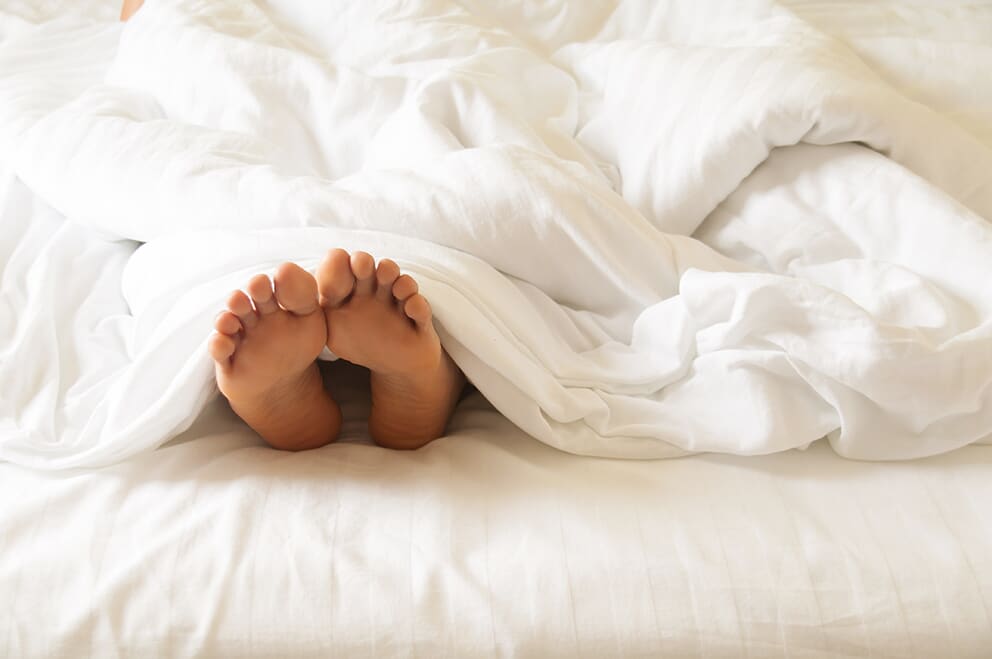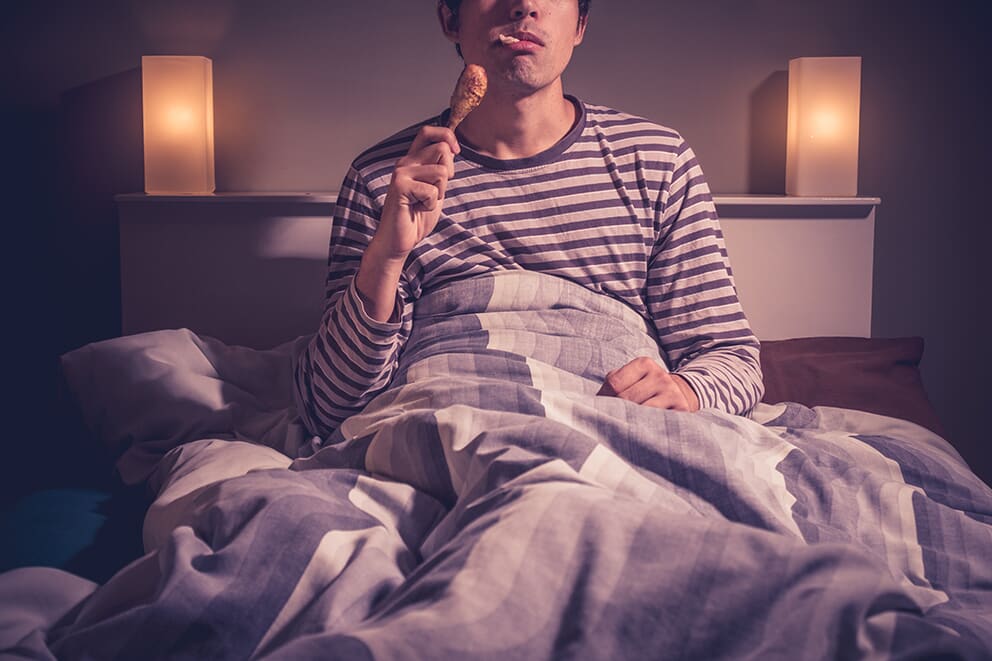The bedroom might be where the magic happens. But it’s also the place where we exhibit some of our most secretive, personal hygiene habits.
It’s no surprise that Brits have spent more time in bed over the past 12 months. So, after surveying 1,000 Brits about their secret non-sexual bedroom habits, MattressNextDay enlisted the expertise of Dr Deborah Lee of Dr Fox Online Pharmacy to reveal the impact of what this could mean for their bedroom and their health.
1 in 14 Brits treat the dead skin on their feet in bed, attracting dust mites which can cause rashes and trigger asthma
7% of the adults surveyed said they have treated the dead skin from their feet in bed. But there’s a problem with that, as dust mites love dead skin.
According to Dr Deborah Lee, “we shed 30,000 to 40,000 dead skin cells every year, and that’s without physically exfoliating. This is 9 pounds – or 4kg of skin – per year.” This is in addition to any dirt, sweat and grease that has built up on your skin all day. By adding to that and treating your feet in bed, you are feeding those dust mites that love dead skin cells.
“House dust mites, and bed bugs, feed on dead skin cells. They then produce droppings which are very irritant to the skin, and are a common cause of allergy, resulting in skin rashes, eczema, and asthma.”
Instead, treat your feet after a long soak or shower, and remember to wash in between your toes. Be sure to also dry your feet completely - especially between your toes - as this will lessen any problems from athlete’s foot or bacteria.

More than 1 in 10 cut their nails in bed which could spell bad news for your nails
MattressNextDay discovered that 11% surveyed are cutting their nails in bed. If you are doing this, make sure you gather all of your nail clippings. Dr Deborah Lee advises “if you don’t want yellow toenails, don’t cut your toenails in bed. Fungal infections thrive in warm, moist environments – such as the bed.”
Interestingly, the best time to cut your nails is after a bath or shower as that will soften your nails. So, when treating your feet, make sure to cut your nails at the same time.
1 in 7 Brits eat their takeaways in bed which could attract pests, and stop you from sleeping
One of the top ten pet peeves in the bedroom is crumbs in the bed. So, it comes as a surprise that 1 in 7 (13%) eat their takeaways in bed. However, pizza boxes, leftover takeaway chicken, and the like can attract flies, ants or even cockroaches
Dr Deborah Lee says that “there’s a tendency to leave dirty dishes or food containers lying around the bedroom floor. These again attract unwanted visitors.” It’s also recommended that you change your bedding once a week. So, if you are eating in bed, that will need to increase to twice a week if you eat in bed to avoid those pesky critters.
Likewise, eating in bed can affect your health as lying down. Dr Deborah Lee states that “if you eat this late at night and then lie down to sleep, you are at increased risk of acid reflux.” Not only that but “your body needs to know that when you enter the bedroom and get into bed, it’s time for sleep.”
If you are going to eat late, why not set your room up with cosy lighting and comfortable bedding to help encourage you to sleep once you have finished that delicious takeaway?

9% wash bed sheets they have slept in after being ill, with other items, which could increase chance of infection
Dr Deborah Lee states that “sweating, coughing, blowing your nose, sickness or diarrhoea – whatever the illness – if you are hopping in and out of bed, your sheets, pillows and duvet cover will be covered with bacteria, viruses, and cell debris. This is a breeding ground for further infections.”
She goes further to say that bedding “should be washed at the highest temperature possible. This should be at least 60°C or above, especially if you have been infected with COVID-19.”
1 in 7 have slept in clothes that they’ve worn outside, but the warmth of a bed could be a breeding ground for germs
14% of Brits surveyed said they had slept in their clothes they have worn all day, which could even be a sign of burnout if many are too exhausted to change after working during the day. But it’s important that you take the time to change out of your outdoor, daytime clothes and prioritise taking time for yourself if you are too exhausted to change.
According to a report, bacteria and germs can survive on your clothes for months, unless washed, so your daytime clothes aren’t as clean as you might think.
Dr Deborah Lee also highlights the importance of getting changed, stating: “When you sleep, the temperature in the bed increases, making this an ideal breeding ground for whatever is on your clothes. Sleeping in a clean pair of PJs is definitely recommended.”
So, if you are thinking about getting straight into bed in your clothes, it’s important to take the time to remove them for an all-round more restful night.
1 in 12 Brits leave wet towels on their bed, which could encourage mould growth in the room
Do you ever get out of the shower and then leave your wet towel on the bed, forget about it, and realise it has been there all day? 8% of Brits surveyed do the same.
Moist environments encourage mould. If you are leaving damp towels and, therefore, damp bedding, mould can grow and release spores. If you have asthma, you are likely more sensitive to these spores which can trigger your symptoms or make them worse. Instead, hang your towel outside to dry or pop it in the tumble dryer. If you have to dry them inside, make sure the room is well ventilated to avoid encouraging mould growth.
Have your bedroom habits damaged your mattress? Here’s how to increase the lifespan of it
As long as you follow the above advice, your mattress should stay in good condition. But there are things you can do to increase the lifespan of your mattress, saving you hundreds in the meantime.
1. Use a mattress protector. Prior preparation and all that… A mattress protector will help preserve the mattress from any water damage that can occur from us even simply sweating at night or spilling your drink from dining in bed. The moisture can cause the mattress materials to age and mean that you have to replace the mattress sooner than you might think. However, a protector can help stop this.
2. You need a good bed frame. A few broken slats or an unsturdy base can affect the quality of the mattress structure, leaving it lumpy and, generally, quicker to replace. But the good news is that a bed frame should outlast your mattress, so it’s well worth the investment.
3. Don’t jump on the bed. Don't be tempted to jump on the mattress, as they are designed to evenly distribute weight. So, putting weight on one side of the mattress regularly by jumping on it is a sure-fire way to affect its longevity.
4. Regularly clean your mattress. The best way to keep on top of your mattress is to keep it clean. The likes of pocket sprung need to be hoovered every three to six months, whereas foam mattresses need to be brushed. Generally, a good sprinkle of baking soda 30 minutes before hoovering should keep your mattress stain and odour free. But always make sure you double check the type of mattress and routine before cleaning.
5. Take extra precautions with pets. If you sleep with your pets, they can affect the longevity of your mattress. What you need is a mattress pad and cover to ensure that they don’t damage the materials of a mattress. We also recommend that you wash your bedding more regularly than once a week if you choose to sleep with your pets.
6. Keep your mattress and bedding ventilated. When it’s ‘new bedding day’, give your mattress a chance to air out before putting new sheets on. Additionally, when you get up in the morning, hold off from making the bed straight away. Instead, let the bedding breathe to avoid a build-up of moisture, allowing those mites to thrive.
7. Don’t forget to rotate your mattress. This isn’t required for all mattresses, but you can certainly try and extend the lifespan of your mattress by doing so. This will help you evenly distribute your weight more and give your mattress the chance to restore itself if you tend to lie in the same spot.
If you are looking for even more tips for the home and your bedroom, check out our Advice Centre.


